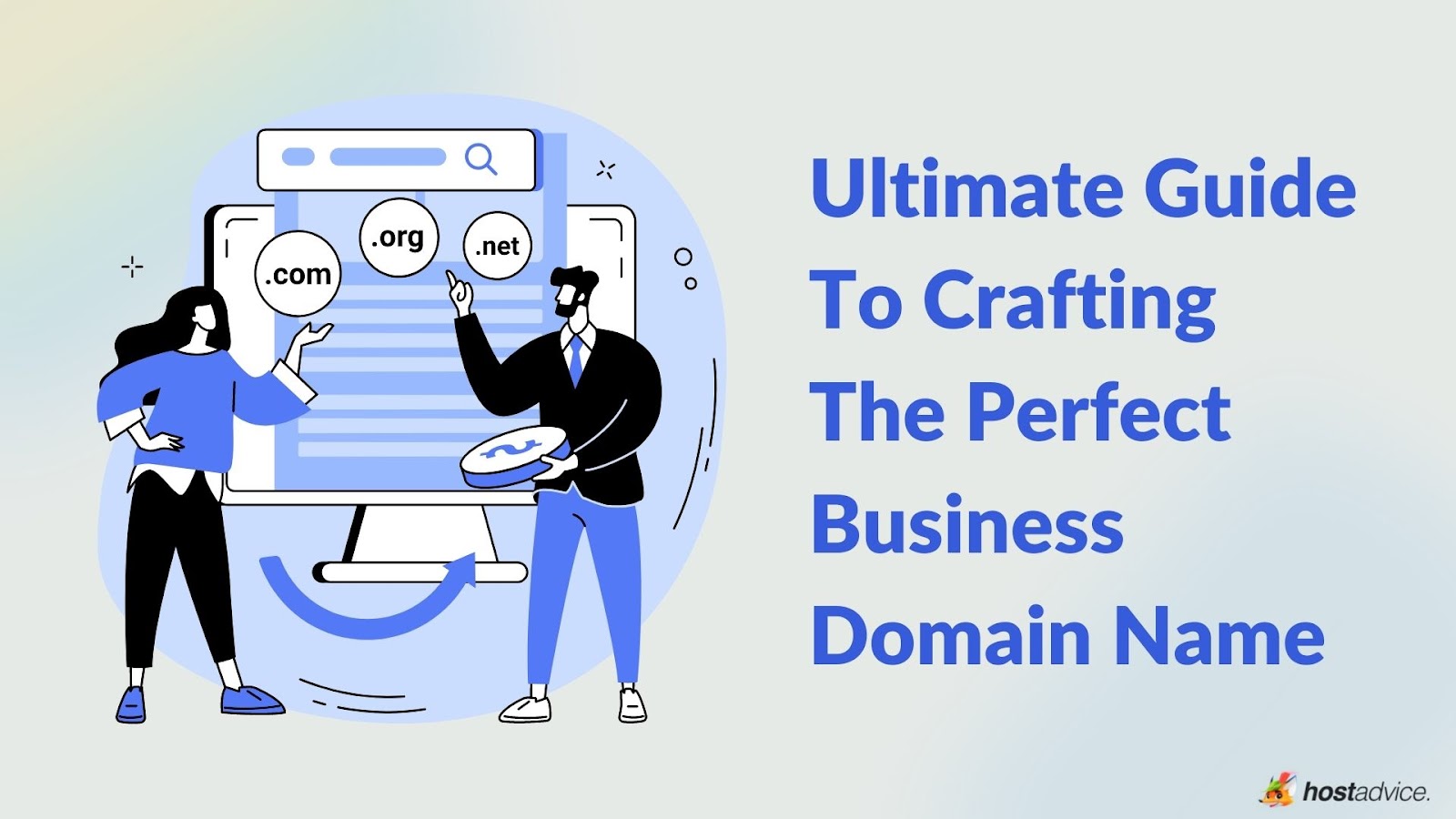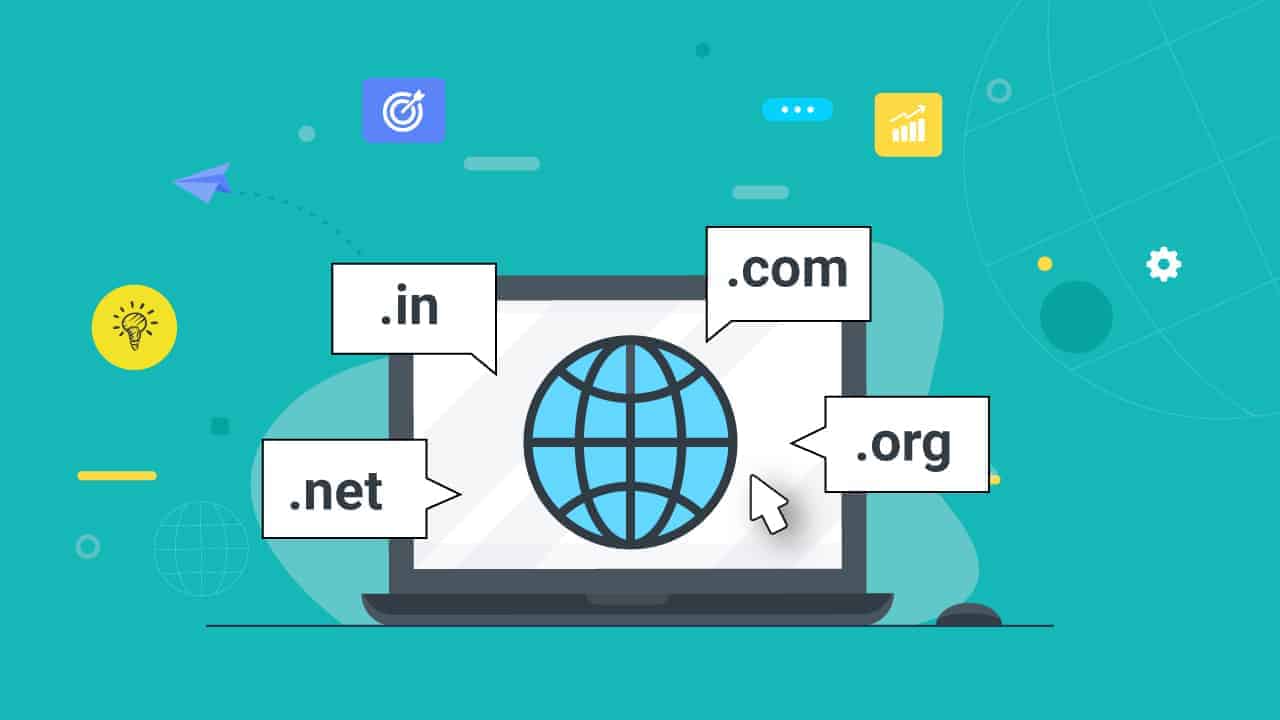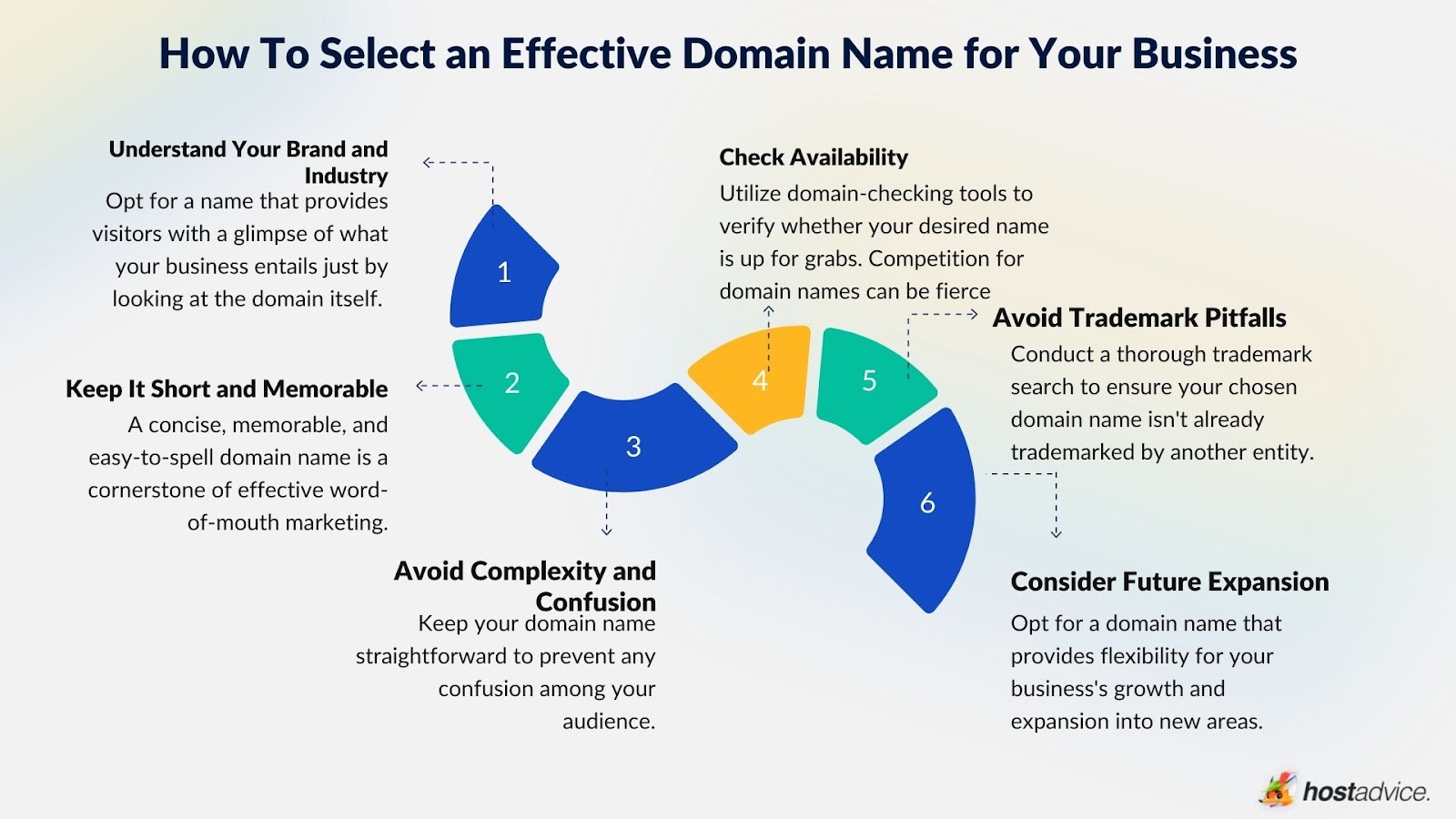
A business domain name in your web address or URL, serves as your company’s virtual address on the internet, much like how people find a physical business through its street address.
In this guide, we’ll unravel the art of selecting a business domain name that reflects your brand and leaves an indelible mark on your target audience. Get ready to build your own website and to embark on a journey that will transform your business’s online identity.
- A business domain name is a digital identity that guides customers to your virtual storefront
- Selecting the right domain name is crucial for creating a lasting impression online
- Custom domains can lead to higher search engine rankings and increased organic traffic
- The domain name should reflect your business’s nature and offerings
- Concise and easy-to-spell names are critical for effective marketing
What Is a Business Domain Name?

A business domain name is a unique web address that serves as your brand’s digital identity. It acts as a virtual store , distinguishing your business in the online landscape.
A business domain name is uniquely tailored to reflect your company and what it offers, serving as the foundation of your online presence. Therefore, selecting a domain name that aligns with your brand’s identity is essential.
Why Do You Need a Domain Name for Your Business?

You need a business domain name for your business to build a solid online presence. A domain name serves as a specific, shareable, and accessible gateway to your business. It is the address that potential customers use to find your business online.
Here are some reasons why having a domain name is indispensable for your business:
- Online Presence and Visibility: A domain name gives you an identity online and makes it easy for customers to locate you virtually. Without a domain name, potential customers may find it difficult to locate your business online.
- Credibility and Professionalism: Customers trust businesses that have a professional online presence. Having a domain name shows that you have invested in your business and are serious about providing quality.
- Branding and Identity: A unique domain name solidifies your brand’s identity. It makes your business memorable and recognizable. It also helps to build brand loyalty, as customers can easily find your business online.
- SEO Benefits: Search engine algorithms favor custom domains, which means having one can lead to higher search engine rankings. Higher rankings can translate to increased organic traffic, more customers, and higher revenue.
- Customized Business Email: With a domain name, you can create a personalized, branded email address, such as info@yourbusiness.com. This can make your business look more professional and established.
How to Choose a Domain Name for Your Business

Choosing a domain name for your business demands careful consideration of various factors. You have to ensure the name effectively represents your brand and helps you carve a distinct identity on the internet.
Understand Your Brand and Industry
Your domain name is your brand’s online identity. To make it resonate with your audience, it should mirror your business’s nature and offerings. Opt for a name that gives visitors a glimpse of what your business entails just by looking at the domain itself.
Avoid any potential confusion with existing brands or websites. Your chosen domain should have the potential to become a strong and recognizable brand in its own right.
Keep It Short and Memorable
Short and sweet isn’t just a preference; it’s a necessity. A concise, memorable, and easy-to-spell domain name is a cornerstone of effective word-of-mouth marketing and customer recall.
Steer clear of complex words, hyphens, jargon, or numbers that might trip up users as they type in your domain.
Avoid Complexity and Confusion
In a world of information overload, simplicity is your ally. Keep your domain name straightforward to prevent any confusion among your audience.
Refrain from using slang, jargon, or acronyms that might not have universal understanding. Your goal is instant recognition, not puzzlement.
Check Availability
The perfect domain name is only perfect if it’s available. Utilize domain-checking tools to verify whether your desired name is up for grabs. Competition for domain names can be fierce, so act swiftly once you find one that fits.
Avoid Trademark Pitfalls
Trademark issues can lead to legal headaches and the potential loss of your domain. Before you commit, conduct a thorough trademark search to ensure your chosen domain name isn’t already trademarked by another entity.
To delve deeper into this, check out these insights on how to register a domain name.
Consider Future Expansion
While focusing on the present is vital, thinking ahead is strategic. Opt for a domain name that provides flexibility for your business’s growth and expansion into new areas. Avoid overly specific names that could limit your business’s potential as it evolves.
Think About Localization
For businesses operating in specific regions, incorporating location-specific keywords into your domain can enhance local SEO efforts and target a precise audience. This localized touch can make your domain more relevant to your target market.
Business Domain Name Examples

When it comes to choosing a domain name for your business, there are four main types that you can consider. Each type serves a different purpose and can help to effectively capture your brand’s essence. Make sure your choice reflects your brand and stands out in the crowded online marketplace.
- Branded Domains: Branded Domains utilize your business’s name for instant recognition and can help to establish your brand identity. Examples of Branded Domains include apple.com and nike.com.
- Descriptive Domains: Descriptive Domains provide a clear idea of the service or product that you offer. Examples of Descriptive Domains include wine.com and modern.energy
- Geo-Targeted Domains: Geo-Targeted Domains highlight location relevance and can be useful for businesses that operate in specific geographic areas. Examples of Geo-Targeted Domains include torontorealestate.com and bostonfurniturerepair.com
- Industry-Specific Domains: Industry-Specific Domains use niche or industry-specific terms. These can help to establish your business as an authority within a particular industry. Examples of Industry-Specific Domains include books.com and pauloduarte.photo
By understanding these different categories, businesses can better tailor their domain name to align with their goals. Take the time to carefully select a domain name that reflects your unique offerings and values.
How To Get a Domain Name for Your Business
Getting a domain name for your business follows a straightforward process, similar to obtaining a general domain name.
Registering a Domain Name for a Business
To secure your business domain, follow these steps:
- Choosing a Domain Registrar: Select a reputable domain registrar like GoDaddy, Namecheap, or Google Domains
- Determine Availability of Your Business Domain Name: Check if your desired domain name is available using the registrar’s search tool
- Consider Domain Costs: Evaluate the registration cost, considering factors like domain extension and premium names
- Register Your Business Domain Name: Add your chosen domain to your cart and proceed to registration
- Choose Registration Period: Opt for the registration period that suits your business’s needs (e.g., 1 year, 2 years, etc.)
- Provide Registrant Information: Enter accurate contact information for the domain’s owner (registrant)
- Configure Domain Settings: Customize settings such as domain privacy, DNS records, and auto-renewal
Transferring Domains
Transferring a domain from one registrar to another involves several steps:
- Unlock the Domain: Before initiating a transfer, ensure the domain is unlocked at the current registrar. This step allows for a smooth transition.
- Obtain the EPP Code: Obtain the EPP code, also known as the Authorization Code, from the current registrar. This code validates the transfer process.
- Initiate Transfer on New Registrar: Use the EPP code to initiate the transfer on the new registrar’s platform. Note that a transfer fee might apply.
- Confirm Transfer: After initiating the transfer, the old registrar will likely send a confirmation email. Make sure to approve the transfer through the provided instructions.
- Completion: The transfer process typically takes several days to complete, during which the domain remains operational. Once the transfer is finalized, the new registrar will manage the domain.
Buying an Existing Domain
If your dream domain name is already claimed, don’t lose hope. You can still make it yours. One option is to reach out to the current owner and negotiate a purchase.
There are several websites, such as Sedo, Afternic, and Flippa, that offer platforms for listing domains for sale. Using these websites, you can contact the owner and discuss purchasing the domain.
Backordering Domains
Another option is to backorder the domain.
- Secure Expiring Domains: If a desired domain is nearing expiration, and you suspect the current owner might not renew it, use a backorder service
- Swift Registration: These services act on your behalf to register the domain as soon as it becomes available
- Reliable Providers: Companies like GoDaddy and NameJet offer backordering services
Leasing or Renting a Domain
You may consider leasing or renting a domain. This flexible approach to domain ownership can be ideal in several scenarios.
- Short-Term Access: Some domain owners offer lease or rental options for a defined period
- Testing the Waters: Leasing can be ideal for testing a domain’s effectiveness before a full purchase
- Temporary Ventures: If you’re entering a temporary market, domain leasing can be a cost-effective solution
Conclusion
Crafting a business domain name is a pivotal step towards building a robust online presence and brand identity. Choosing the right domain name involves a blend of creativity, foresight, and practicality.
Your domain is more than an address. It’s the bridge between your brand and the digital world. Crafting it with care will ensure your business stands out, communicates effectively, and thrives in the ever-evolving online landscape.
Focus on aligning with your brand’s essence, and consider factors like simplicity, availability, and future expansion. With these, you can create a domain name that resonates with your target audience and sets you apart in the digital world.
Next Steps: What Now?
Now that you’re armed with insights on choosing the perfect business domain name, take these practical steps:
- Get a Free Domain Name: Explore options for acquiring a free domain name that fits your business
- Top-Level Domain: Discover the advantages of choosing the right top-level domain (TLD) for your business’s online identity
- Premium Domains: Find out everything you need to know about premium domains and choose one for yourself
- Domain Name Generators: Choose the best domain name generator that will generate the perfect domain name for you
How to Get a Free Domain Name: 3 Proven Methods
What Is a Domain Name? A Beginner’s Guide
What is Second Level Domain? Choosing and Utilizing Your Web Identity
Types of Domains: Benefits, Examples and How To Choose One
What Is a Premium Domain? Elevate Your Digital Footprint
The 10 Best Domain Name Generators
Fully Qualified Domain Names (FQDNs) Explained
What Is a Parked Domain: Examples & How to Buy One
Domain vs Hosting: Key Differences & How They Work Together
What Happens to Expired Domains? Exploring Their Journey and Destiny
Hostname vs. Domain Name: What’s the Difference?
Domain vs. URL: Definition and Key Differences
Domain Name Management: Everything You Need to Know
AWS Domain Name: How to Register with Route 53
What Is an Apex Domain? A Handy Guide for Beginners
What Was the First Ever Registered Domain Name?
How to Host Multiple Domains on One Server?
Can You Trademark a Domain Name? What You Need to Know
What Is a Custom Domain: Benefits (& How to Get One)
What Is Domain Alias & How to Create One in Control Panels?
What Separates the Components of a Domain Name?
What Is Domain Forwarding and How to Use It for Your Website?
Aged Domains: Unlocking the Power of Established Online Identity
What Is an Addon Domain and Why Is It Important?








